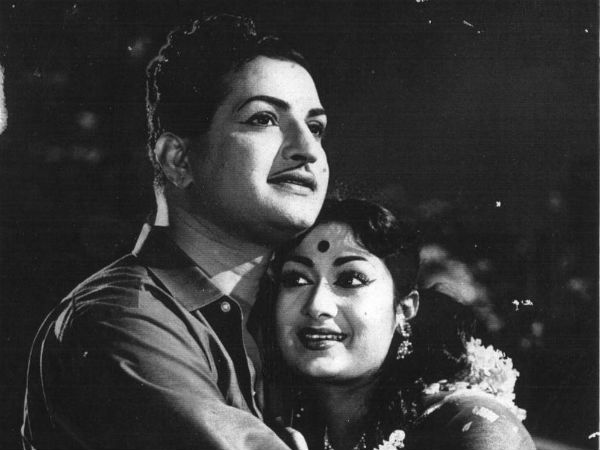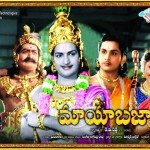In continuing our coverage of Classic Andhra Cinema, we examine another of the all-time favorites: Missamma.
Story
A Telugu story that very much cuts across caste and creed, it is a tale of a Christian girl who falls in love with a Hindu boy, and the subsequent situational comedy that ensues. The fundamental centrality of Dharmic Indian culture is very clearly seen not only in story, but in the showcase of both classical Indian music and dance. Despite their differences in creed, neither converts, and it is the centrality of Bharatiya Samskruthi that serves as their common unifying factor–rather than foreign imposed frameworks.
But the true standout aspect of this 1955 Romantic Comedy is that the protagonist and central character is a woman, masterfully played by the original Top Actress of Tollywood: Savitri. The object of her affection is none other than the legendary NT Rama Rao himself, clearly at the peak of his powers here. Both play unemployed young, unattached graduates on the make, seeking to make a life for themselves. Due to residential circumstances–in a way that anticipates the 70s American sitcom Three’s Company, albeit, in a more traditional Indian way–they end up having to pass off her character, Mary, as Mahalakshmi–MT Rao’s wife. The ensuing hilarious hijinx results in creating one of the truly timeless classic films of Andhra, and indeed, Indian Cinema.
While the first half starts off rather slow, there are a number of memorable scenes, above all, the incisively cheeky song: Aduvaari maatalaku, ardhaaley veruley [The words of Women have different meanings]
However much feminists may outrage, it is a universal sentiment that is playfully treated in this ever-green ghaana, acted out expertly by the ever-funny Relangi.
Nevertheless, the ploddingly-paced pre-intermission portion sets up what will soon be a rapid-fire barrage of comedy that ensues in the second half. Another leading man of the era, ANR, should be particularly noted for demonstrating his range, providing much fodder of funny in the movie as seen here:
The inter-religious nature of the romance is treated with both dexterity and bathos. Indeed, while Mary is a stubbornly devout Christian, MT Rao (NTR’s character) handles this narrow-mindedness skillfully, and shows his mature acceptance of all different faiths.
While not famous for its romantic dialogues, the chemistry between Savitri and NTR’s characters has all the hallmarks of Sringara.
Production
This movie is responsible for launching one of Telugu Cinema’s greatest artistes, the actress Savitri. In what proved to be her breakout role in film, she won the hearts of audiences of what was then Madras based, South Indian Film-dom. Situational conflict worthy of Missamma itself resulted in the actress original slated to play the title character walking out, paving the way for the rising star.
The pairing of Savitri and NTR is exquisite. Savitri plays the traditional Telugu girl, easily piqued and ever-conscious of respectable reputation, while Rama Rao is teasing, witty, and aspirational in this snapshot of post-Independence Andhra. It’s very much a modern story in a modern (vs post-modern) setting, all while remaining undeniably Indian in its inspiration and essence.
Hilarity aside, at its core, Missamma is a romantic movie, in both senses of the word. There is even an heroic dream sequence to boot for our movie’s damsel in (comedic) distress.
The production team and cast were so strong, that 1957’s Maya Bazaar would retain most of them, as well as this over-arching sense of Sringara. While Akkineni, Nageshwara Rao, SV Ranga Rao, Gummadi, and Relangi are all strong supporting members, the other standout besides the leading actress herself is Jamuna. Playing what is arguably the original “bhutta-bomma” of Telugu cinema, she comes across as nothing short of a doll, in her dance and dialogue. Serving as romantic rival to Savitri, her character’s chemistry with NTR, and common religion, is cause for much jealousy on the part of Mary, which we see in the first song below. As we say in Telugu, “Nijamga Sathayinsthundhi” [She truly irritates her], and this friction between the two characters is the source of many laughs.
Songs
The paatas naturally touch on various themes in the story. Some compositions are more comedic in nature, and others more oriented towards love, but the clever-treating of the inter-religious nature of the romance is also well handled in songs such as Brindavanamadi Andaridi, Govindadu Andarivadey le [Vrindavan is for Everyone, Govinda belongs to Everyone].
Of course, songs of that bygone era almost always included the lullaby-reveries that more than any other language, Telugu does best.
Appropriately enough, the most important song in the movie is probably the least celebrated. And as a sign of the times, an all too forgotten theme is the name of the song itself : Dharmam Cheyi Babu [Do your Dharma, young man]
Again this song demonstrates how Dharma remains our timeless Indic principle that cuts across caste and creed. While in this case, it is done somewhat mockingly with the con-man sidekick, Devayya, the message is clear enough: while broadcasters may not always be genuine, it’s what is being broadcast that matters.
In a wonderful tribute to our classical high culture, the main character is seen singing one of Tygaraja‘s classic Krithis: Raaga Sudharasa
Incidentally there were several remakes, starting with the Tamil “Missiamma” below. While some (South of the Penner) may call it the first true Telugu-Tamil bilingual film due to change in cast, the prior release of the Telugu rendition as well as the Aaduvari song is what truly make the Telugu version the original (as do the very Telugu Savitri and Jamuna):
A Hindi version (“Miss Mary”) later followed (which retained Jamuna) and starred Meena Kumari in the title role, with Gemini Ganesan again playing NTR’s character.

Even a TV Serial was later developed (though it appears to depart heavily from the original concept)
A Telugu remake eventually came along in 2003; however, it seems at best inspired by the original rather than a verbatim re-enactment. From the plot, it’s apparent that it was merely capitalizing on the name of the original, leaving the door open to a truly recreated Missamma for the current generation.
Ultimately, Missamma is a must-watch for any aspiring aficionado of Andhra Cinema. While I’m not quite sure what the verdict was on the remakes (readers are free to opine on this), a fairly recent song inspired by the original demonstrates, as Missamma expertly did in its own time, the value of updating our culture: Keeping the spirit of tradition, while making it relevant to the times.
Cast
Nandamuri Taraka Rama Rao – M. T. Rao
Savitri – Mary / Mahalakshmi
Akkineni Nageshwara Rao – A.K. Raju
S.V. Ranga Rao – Gopalam
Relangi Venkatramaiah –Devayya
Jamuna –Sita
Rushyendramani – Gopalam’s wife
Allu Ramalingaiah –Musali Panthulu
Ramana Reddy – David
Balkrishna –Govind
Doraiswamy –Mary Pempudu thandri
Gummadi –Employer (guest role)
Language
Telugu
Remakes: Tamil & Hindi
Runtime
225 minutes
Release Date
1955
Color
Black and White
Director
L.V.Prasad
Writer
Pingali, Nagendra Rao
Producers
Chakrapani & B. Nagi Reddy
Music
Saluri, Rajeshwara Rao
Raja A.M. –playback singer
Leela P. –playback singer
Ghantasala Venkateswara Rao –playback singer
P. Susheela –playback singer
Relangi Venkatramaiah
Cinematography
Marcus Bartley
Art Direction
Madhavapeddi Gokhale
References:
- http://www.imdb.com/title/tt0251847/?ref_=fn_al_tt_1
- http://www.thehindu.com/todays-paper/tp-features/tp-fridayreview/missamma-1955/article6508169.ece












